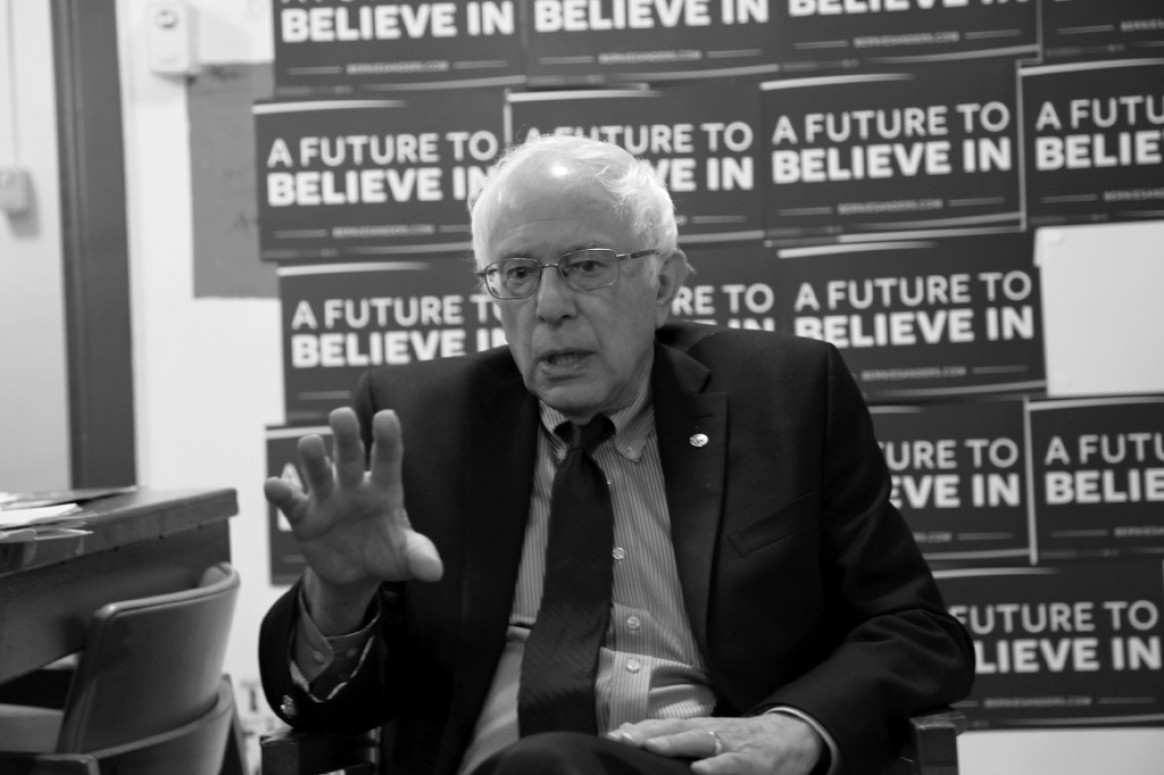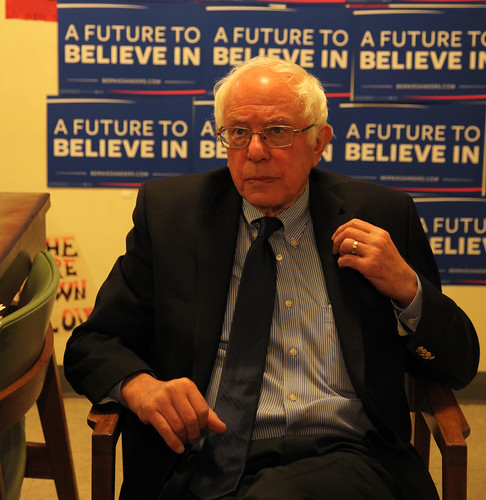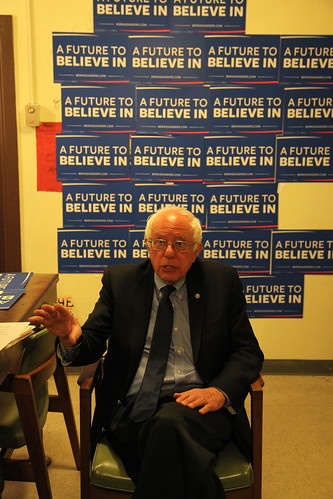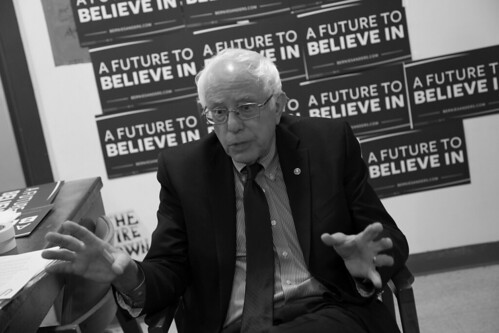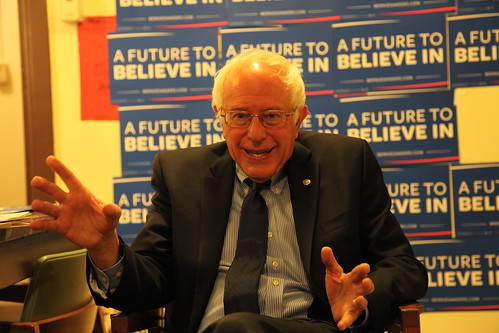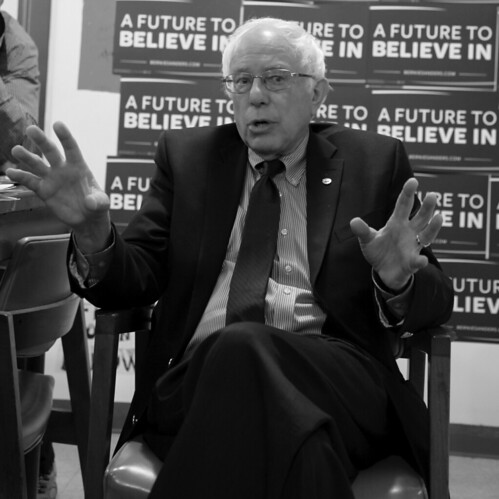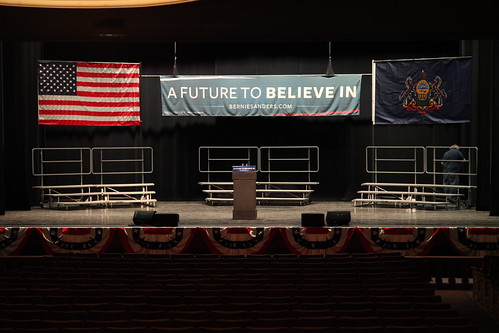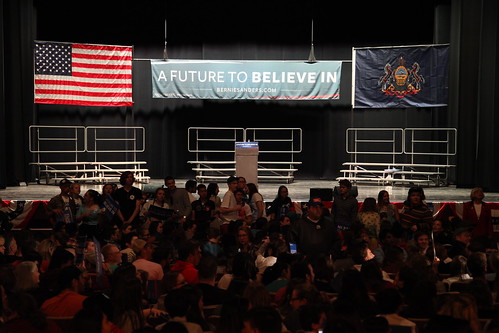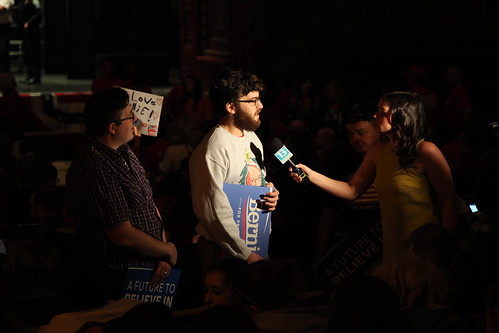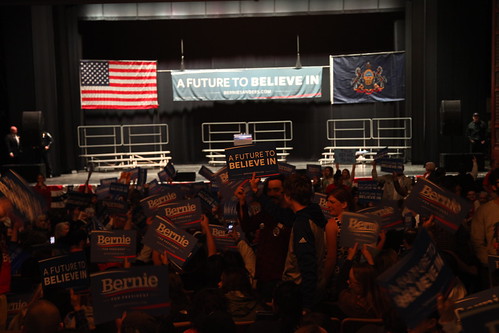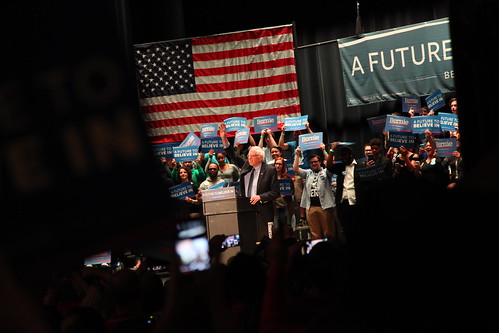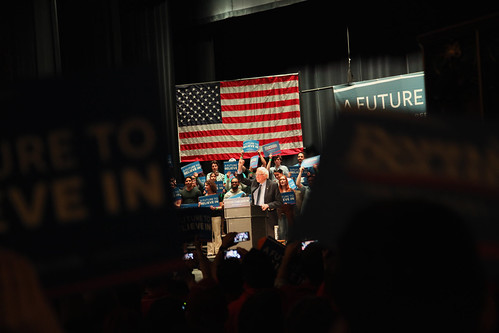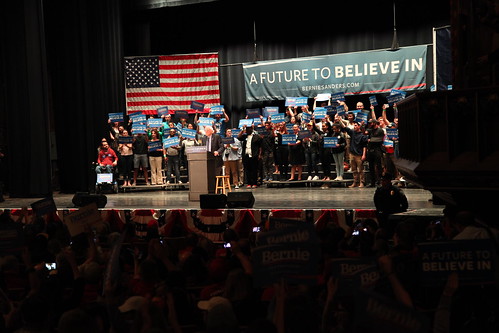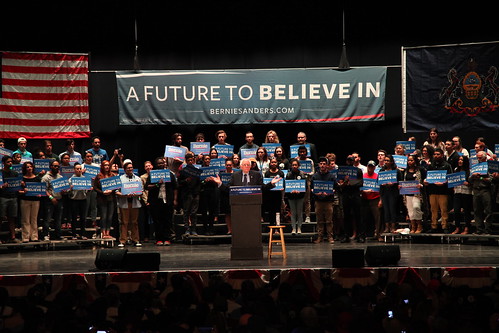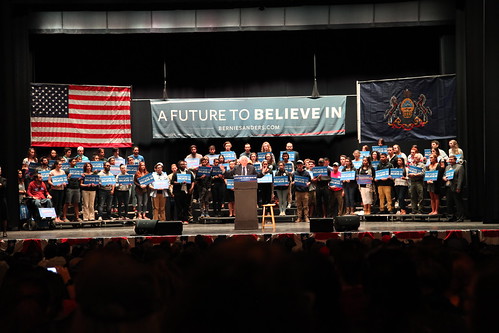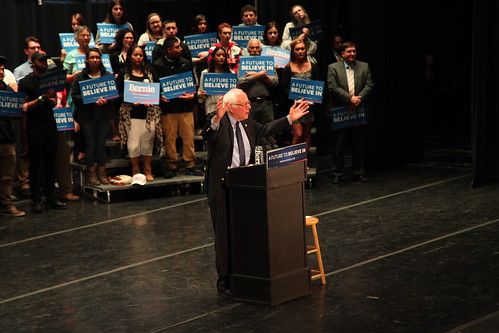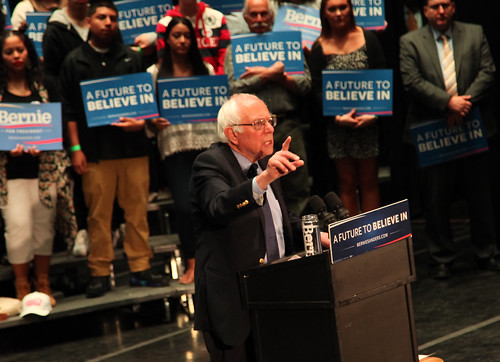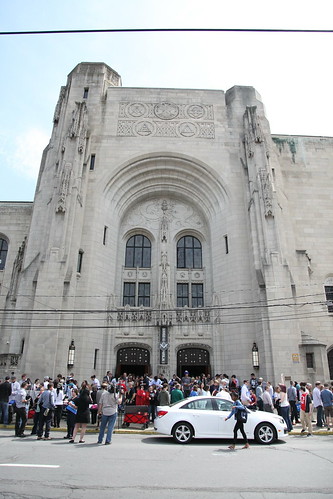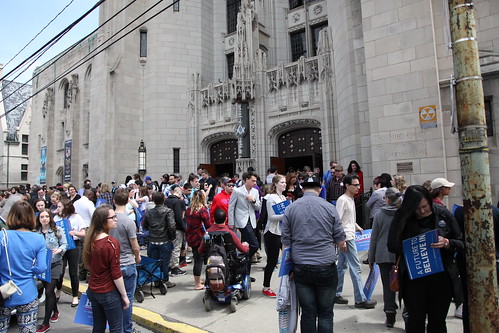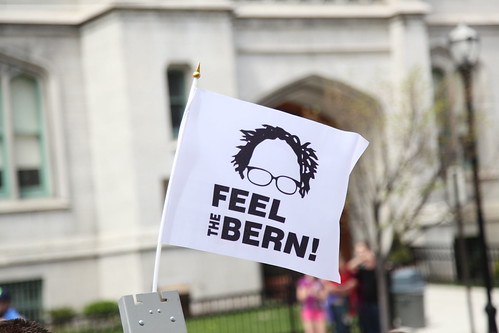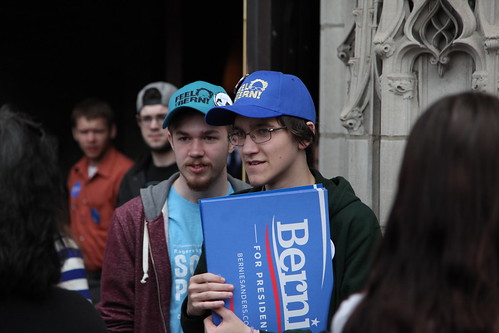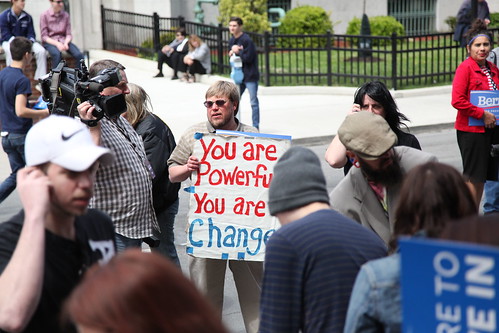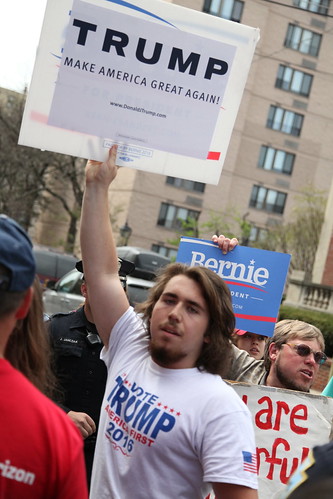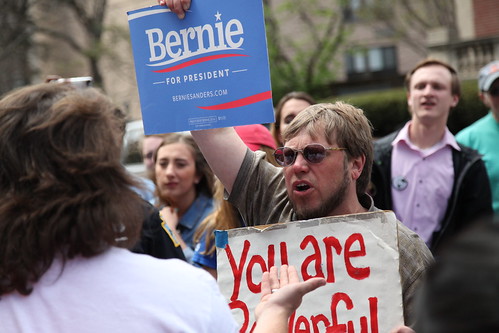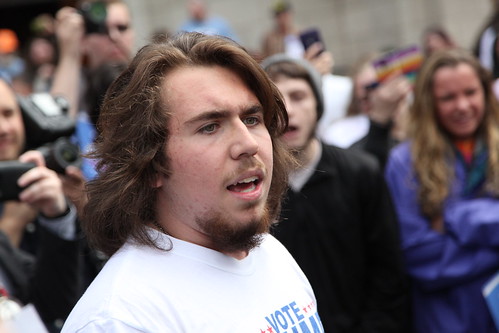“Are we really going to interview Bernie Sanders in a bathroom?”
It was actually a dressing room, but with long horizontal mirrors, a row of sinks, and stalls off to the side, essentially, yes, it was a bathroom. While taking pictures as the presidential candidate’s supporters packed the main auditorium of the Scranton Cultural Center on Thursday morning just after 10 a.m. to hear him speak before the Pennsylvania primary, NEPA Scene was suddenly and unexpectedly escorted with only two other reporters out of dozens of media outlets down to the basement for an exclusive interview.
Our guide was a pleasant, organized young woman from Arkansas in her 20s – a demographic that the self-proclaimed democratic socialist has been popular with since the beginning of his grassroots campaign. Despite being 74, Sanders has resonated with young voters through his unwavering cry for a “political revolution,” in his own words, pledging to take big money out of politics and forcing the government to truly represent the people, not the interests of the elite few.
It’s pretty clear that the other journalists have largely written off the spry senator from Vermont before he even enters the room, and it’s not simply because of their age – they’ve covered many elections before and see little hope for him after rival Democrat Hillary Clinton won more delegates in New York on Tuesday. This means he’ll have to practically double his delegate count in order to secure his party’s nomination, and with only a few state primaries left, it’s a fight that seems futile, though that word doesn’t seem to be in Sanders’ vocabulary.
The plain painted brick walls are adorned with drawings and cast signatures of various shows that have come and gone through the Cultural Center, adding color to an otherwise sterile area with harsh yellow lighting. It’s interesting to note that, as the conversation continued, both seasoned reporters completely disagreed on who would ultimately win the 2016 election, Clinton or prospective Republican nominee Donald Trump, proof that it truly is anyone’s game at this point in the race.
We are moved to another dressing room across the hall as Sanders is rushed past us for a quick radio interview; one wall is covered with campaign posters that read “A future to believe in,” providing a slightly more pleasant backdrop for photos. Cramped on the other side of his chair with Secret Service hovering around, he finally sits down to speak with us for an undetermined period, so there is no room or time for elephants – he’s immediately asked if he has considered dropping out in light of his New York loss, which is met with a steadfast “no.”
To stop now and not give people a choice would be “blatantly anti-democratic and unfair,” he feels.
“I have a very radical concept of American life. I believe in democracy. I know it’s a radical idea, but that is what I do believe in. And, what that means is that the people in Oregon, California, Washington, D.C., should have the right to vote for who they want not only to be president of the United States, but the kind of agenda they want that president to fight for,” he began, though he acknowledged the odds he’s up against.
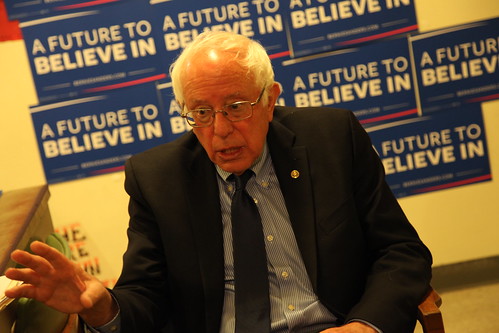
“I am very good at arithmetic, and I am more than aware that our path to our victory is a narrow one. I accept that. That’s why I’m going to fight as hard as we can here in Pennsylvania and four other states.
“Next Tuesday, I think we have a good chance to win some of those states. And I would just conclude by saying when we began this campaign, I was 60-65 points behind Secretary Clinton in the national polls. The last couple of weeks, some of the polls had me up ahead by a few points, had her up ahead by a few points. We have come a very, very long way, and it is important that the people in every state in this country have a right to determine what agenda they want the Democratic Party to push for, and I intend to allow that to happen.”
When asked what he would do specifically for Pennsylvanians, there is again no hesitation in his response. Pointing out that thousands of jobs in the area have been lost as companies moved operations to Mexico and China, he said that he would not only demand that those corporations return jobs to the United States and give tax breaks to small businesses, but that he would also invest over $1 trillion in infrastructure, creating more jobs and possibly even funding the long-awaited railway from Northeastern Pennsylvania to New York City.
“When I talk about rebuilding our crumbling infrastructure, when I talk about putting a trillion dollars into that, a significant part of that goes into building a new rail system. I can’t sit here and tell you that we’re going to build a rail system between here and there or there and there. That is for local, state, and federal officials together to make that determination. But I will tell you that we will invest very heavily in rebuilding our rail system, which is falling behind many other countries in the world,” Sanders clarified.
“When I talk about transforming our energy system away from fossil fuels, that includes investing in rail.”
Ignoring a slight cough, the Brooklyn native talked fast and motioned often with his hands, emphasizing each point and never avoiding the tough questions, like how he plans to accomplish goals that critics feel are too lofty, particularly in light of Republicans obstructing President Barack Obama’s agenda at practically every turn.
“I’ll tell you how you get things done. You get things done by rallying the American people to demand their Congress respect what the American people want to see happen rather than the wealthy campaign contributors. So I will answer your question in two respects. No. 1, I have worked with Republicans during my tenure in the House and in the Senate. A couple of years ago, along with people like John McCain, a Republican, I helped pass the most comprehensive VA health care legislation in this county, a $17 billion piece of legislation to improve VA health care, so I can work with Republicans. I did that in the House as well,” he noted.
“But secondly, the real issue facing this country right now is that you have a Congress who does the bidding of wealthy campaign contributors, of Wall Street, of corporate America, and to a large degree ignores the needs of the American people. This campaign is self-titled – it’s not just elect Bernie Sanders president. It is creating a political revolution – create a situation where millions of people stand up, fight back, and demand that we have a government that represents all of us, not just the 1 percent.”
Before anyone can attempt to hamper his momentum, he offers another real-world example.
“Let me give you an example of how that works. How that works is right now, in Oregon, California, New York state, legislation has recently been signed to raise the minimum wage to $15 an hour. That happened not just because the governors wanted to do that; it is because the people of those states demanded that. That’s how change takes place, when people of the grassroots demand it into the status quo. That’s what we’re going to do if I’m elected president.”
When asked what role he intends to have in the Democratic National Convention in July, his dry humor came through.
“Well, I hope to accept the nomination. That would be the role,” he enthused with a smile.
“I’m looking forward to giving a really good nominating speech. If that does not happen, we will have – [it’s] impossible to predict, we have 1,200 delegates as of today, that number obviously will go up – so we’ll have 40-45 percent, whatever, of the delegates of the convention, and I would hope that our delegates, plus some of the rest of the delegates that Clinton may have, will fight for a platform that speaks to the needs of the middle class and working families, that demands that the Democratic Party take on the 1 percent, take on Wall Street, and create a government that works for all of us and not just wealthy campaign contributors.”
Announcing his campaign for president one year ago this month, NEPA Scene inquired about what he had seen on the road and if anything still surprised him, even after serving many years in public office and fighting for civil rights as a young man.
“I love my state. I’m very proud to represent Vermont in the United States Senate; I’ve done that for over nine years now. But when you get around the country, you see things, you hear things, that you were not as aware of as you should have been.
“Just the other day, campaigning in New York, I was in Brownsville, New York. I was at the housing projects there. They’re falling apart. They’re literally deteriorating because of inadequate funding. You have unemployment rates of 30, 40, 50 percent in those African American neighborhoods. You have too many of those kids not going to college, but going to jail. You have recreation buildings which are literally bolted up. Kids can’t get into playgrounds, can’t get into community centers. That’s what I saw just two, three days ago. Why is that happening in the richest nation in the history of the world?
“I was in Flint, Michigan. I talked to parents whose children had been poisoned by the water that they’re drinking. That’s a problem not just in Michigan. That’s a problem right near here, isn’t it? We have poisoned water. Why is that happening in America?
“I was in Arizona talking to young Hispanic kids, tears rolling down their eyes in fear that their parents might be deported. We can do better than that. We can pass comprehensive immigration reform.
“I’ve talked to too many young people who are paying off student debt for year after year after year, greatly impacting their lives. Why are kids graduating college $30, $50, $70,000 in debt when we should be encouraging young people to get the education they need, not penalizing them?
“When you run for president, it’s an amazing experience talking to people, talking to Native American people, hearing what’s going on on reservations in Native American communities, so it’s just been an eye-opening experience, and I’ve enjoyed it immensely.”
Just before taking the stage at noon for an hour-long town hall speech that covered his positions on everything from education to fracking, he was reminded of just how important young voters have been in his campaign, moving him from unlikely underdog to popular contender for POTUS among more established household names.
“We have now spoken to more than one million people in events like this from the early start of our campaign. And when the campaign began, I think the general punditry thought, well, young people, they don’t vote. They’re not interested in politics. They’re interested in their video games, in partying, or whatever it may be. Turns out not to be the case, that a significant number of people have come out to our rallies, who have participated in the movement, are young people who are determined to play a role in helping to shape the future of this country. That has been, I think, really enormously important for the future of our country. They are the future of our country, and it’s imperative that they do get involved, but it’s also very gratifying for me personally to see so many young people standing up and willing to fight back,” he said.
“And I would also conclude by telling you this. That if you look at all of the polling, if you look at the exit polls, we are doing much better than Secretary Clinton, not just among the very young, not 20-year-olds, we’re doing better among 45-50-year-olds and younger. That is the future of this country. That is the future of the Democratic Party. And if the establishment thinks that they can ignore what these young people, and by young people I don’t mean just 20-year-olds, what younger people in this country in their 40s, in their 30s are saying, they will be making a tragic, tragic mistake.”
Agree or disagree with his politics, writing Sanders off would indeed be a mistake, even if he doesn’t clinch the nomination. In just a few short months, despite mainstream media blackouts and dismissive political “experts,” it’s clear that he has managed to shift the national conversation to issues that presidential candidates have virtually ignored for decades. His opponents in both parties have responded and altered their campaigns in kind, and youth support for his no longer radical ideology isn’t just going to fade away with his candidacy.
Following a few quick handshakes, he was already halfway up the long, narrow stairwell leading backstage and we were back in a now standing-room-only auditorium before we knew it. Sure, it was a strange place to meet a presidential candidate, to come face to face with a man who has been on our television and computer screens almost nightly for the better part of a year, but even bathrooms have become a common subject for political discourse these days.
It’s an election where truly anything can happen, especially for this idealistic, progressive candidate. If we weren’t sure of that before, we certainly are now after 10 minutes in a basement dressing room.
by Rich Howells
Rich is an award-winning journalist, longtime blogger, photographer, and podcast host. He is the founder and editor of NEPA Scene.

